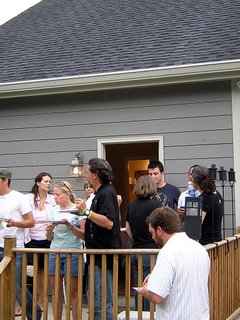In her recent
Nashville Scene article, "
Soundsville" (I think "Soundstown" has a much better ring to it), Christine Kreyling mentions three aspects of the new plans that she is less than satisfied with. I want to address two of them:
- From a "design perspective" the residential and retail components (including the "too tall" condo tower next to Gateway) are "wedged willy-nilly onto the site."
- The ballpark's form is diluted by the awkward turn of the corner at Gateway and 1st Avenue, where a square porch juts out from the stadium's rounded home plate wall.
In my opinion, point #1 is somewhat off base and worth a critical response. Point #2 seems an entirely valid criticism of the Struever Bros. master plans for the corner.

Let's consider Kreyling's "willy nilly" wedge criticism first. One of the charming strengths of the planned ballpark that
I have emphasized before is the classically urban manner in which it and the surrounding developments are being shoe-horned into a space without altering easements or fabricating faux impressions of unusual angles. I'm no design specialist, but it seems to me that part of the trade-off for literally building a park like the old ones is that regular geometric architecture will seem wedged in and somewhat forced. I'm not sure how the buildings could look unwedged.
Moreover, baseball is unique in the sporting world insofar the different urban landscapes forced the homefield boundaries to be asymmetrical and variable, rather than congruous and identical to any other. Baseball's order also entertains some chaos. The basic lines (baselines and distance from pitcher to batter) internal to the game may be uniform, but the boundaries of the game vary from field to field. Contortion and wedging are central to baseball's design. Surrounding architecture is going to be affected by that design.

Besides the practical limitations of this unorthodox fit I do not see aesthetic problems in the initial plans. When I look at the architectural renderings of the field-box view of the proposed parking garage behind the left field fence, I see a shorter, smaller version of the long lateral warehouse feature behind the rightfield bleachers at Oriole Park at Camden Yards.

And design-wise, the Shelby Street Bridge seems to extend that sense of latitude over center field in the sketches. The Camden Yards ballpark is widely acknowledged as one of the more attractive ones in baseball, rather than as one attached to a building wedged willy nilly.
On the charge of willy nilliness, though, I wonder if one cannot look at another attractive park and judge the same of the neighborhood bordering it. The neighborhood standing behind the outfield bleachers at Wrigley Field in Chicago provides a backdrop of various kinds of buildings of different scales that might be considered willy nilly.

There are low-rise brownstone townhouses on Waveland Avenue and behind them the high-rises and skyscrapers of vintage and contemporary style that dot Chicago's Northside. The skyline is scattered and varied, but no less snug than if it had been so planned since Wrigley was built almost a hundred years ago. It might be a designer's nightmare, but I bet you would be hard-pressed to find any baseball fans who see it in any other way but beautiful. As long as the buildings themselves on the Soundstown property are attractive and appropriate to the ballpark, I do not see their layout as some kind of random eyesore.
While I fail to see the wedge problems Kreyling does, I absolutely agree with her about the design of the external wall behind homeplate at the corner of Gateway and 1st Avenue. One of the problems I have with many of the new baseball parks designed to look old is that I find one or two prominent elements just off kilter, like the cheesy, strip-mall-inspired "spires" of Ameriquest Field in Texas.

(Incidentally, Ameriquest also deconstructs itself by self-presenting an "urban park" in a suburban strip-mall district).
In the plans for the Nashville ballpark, the squared corner that the architects seem to have stuck on the rounded edge behind homeplate is ugly and actually detracts from the ballpark-feel of the place.

It is a contemporary sharp geometric point that masks the softer, more nostalgic lines of baseball grandstands, which themselves mirror the outfield bend of the infield dirt. The homeplate entrance being at an intersection is a natural marquee, especially in a walkable neighborhood less reliant on car cultures. The architects would have done better to look to the past for their inspiration for the homeplate entrance. Kreyling mentions Yankee Stadium as a guide.
I would refer them again to Wrigley Field, whose marquee sits at a bustling Chicago intersection.

The natural rounded shape of Wrigley Field provides a center and orienting point around which the rest of the neighborhood shops and restaurants radiate. It is a marquee building because it does not exactly mirror the angles of the street like other buildings do. The new downtown ballpark here would only benefit by matching Wrigley's character, even if not exactly duplicating its exterior. People go to Wrigleyville even in the off season just to gawk at Wrigley Field's facade. The Sounds and their architects should drive for the same sort of visual impact at the corner of Gateway and 1st Avenue.


























